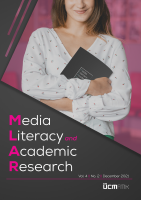Pseudo-Authorities as a Manipulation Tool in the News Coverage of “Sputnik V”
Pseudo-Authorities as a Manipulation Tool in the News Coverage of “Sputnik V”
Author(s): Ekaterina TenevaSubject(s): Education, Psychology, Media studies, Communication studies, Sociology
Published by: Univerzita sv. Cyrila a Metoda v Trnave, Fakulta masmediálnej komunikácie
Keywords: Media Literacy;Pseudo-authority;Coronavirus;Covid-19;Sputnik V;Manipulation;Rhetorical strategy;Internet news discourse;
Summary/Abstract: The present article is devoted to the issues of public opinion manipulation in the post-Covid era. Within the framework of the study, the author introduces the concept of “pseudo-authority”which is defined as a rhetorical strategy used by journalists with the aim of the manipulation of the Internet news reports that contain either appeals to non-experts' opinions or no indication of the authoritative source of knowledge so that the information is perceived by the audience as the truth and does not require evidence. The study is also focused on the distinction between appeals to authority and pseudo-authority, which is vital for developing skills of media literacy.Through the discourse analysis of the news stories about the Russian vaccine “Sputnik V”extracted from highly circulated British and American online newspapers, it is revealed that there are three main types of appeals to pseudo-authorities in Internet news discourse: appeals to “nominal” and “implicit” pseudo-authorities as well as appeals to “pseudo-visibility”. The study found that these appeals are used with the aim of political decision-making, enhancing or discrediting the image of the country as well as polarizing social groups in digital information warfare. The results of the research can be applied in the fields of linguistics, political and media studies.
Journal: Media Literacy and Academic Research
- Issue Year: 4/2021
- Issue No: 2
- Page Range: 148-165
- Page Count: 18
- Language: English

